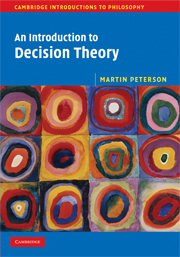Book contents
- Frontmatter
- Contents
- Preface
- 1 Introduction
- 2 The decision matrix
- 3 Decisions under ignorance
- 4 Decisions under risk
- 5 Utility
- 6 The mathematics of probability
- 7 The philosophy of probability
- 8 Why should we accept the preference axioms?
- 9 Causal vs. evidential decision theory
- 10 Bayesian vs. non-Bayesian decision theory
- 11 Game theory I: Basic concepts and zero-sum games
- 12 Game theory II: Nonzero-sum and cooperative games
- 13 Social choice theory
- 14 Overview of descriptive decision theory
- Appendix A Glossary
- Appendix B Proof of the von Neumann–Morgenstern theorem
- Further reading
- Index
3 - Decisions under ignorance
- Frontmatter
- Contents
- Preface
- 1 Introduction
- 2 The decision matrix
- 3 Decisions under ignorance
- 4 Decisions under risk
- 5 Utility
- 6 The mathematics of probability
- 7 The philosophy of probability
- 8 Why should we accept the preference axioms?
- 9 Causal vs. evidential decision theory
- 10 Bayesian vs. non-Bayesian decision theory
- 11 Game theory I: Basic concepts and zero-sum games
- 12 Game theory II: Nonzero-sum and cooperative games
- 13 Social choice theory
- 14 Overview of descriptive decision theory
- Appendix A Glossary
- Appendix B Proof of the von Neumann–Morgenstern theorem
- Further reading
- Index
Summary
Jane is having a romantic dinner with her fiancé in a newly opened French bistro in Santa Barbara, California. After having enjoyed a vegetarian starter, Jane has to choose a main course. There are only two options on the menu, Hamburger and Lotte de mer. Jane recalls that Lotte de mer means monkfish, and she feels that this would be a nice option as long as it is cooked by a first-class chef. However, she has some vague suspicions that this may not be the case in this particular restaurant. The starter was rather poor and cooking monkfish is difficult. Virtually any restaurant can serve edible hamburgers, however.
Jane feels that she cannot assign any probability to the prospect of getting good monkfish. She simply knows too little about this newly opened restaurant. Because of this, she is in effect facing a decision under ignorance. In decision theory ignorance is a technical term with a very precise meaning. It refers to cases in which the decision maker (i) knows what her alternatives are and what outcomes they may result in, but (ii) she is unable to assign any probabilities to the states corresponding to the outcomes (see Table 3.1). Sometimes the term ‘decision under uncertainty’ is used synonymously.
Jane feels that ordering a hamburger would be a safe option, and a hamburger would also be better than having no main course at all.
- Type
- Chapter
- Information
- An Introduction to Decision Theory , pp. 40 - 63Publisher: Cambridge University PressPrint publication year: 2009
- 2
- Cited by



